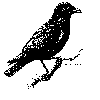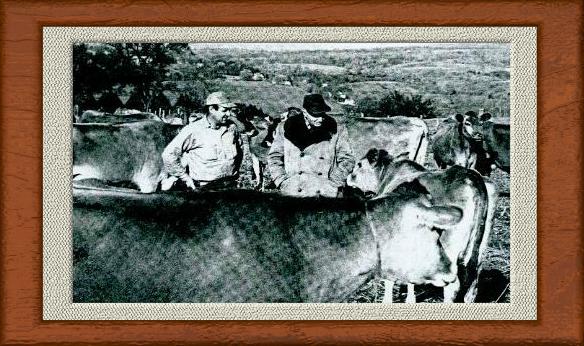
JCROWS.COM

|
|
|
|

"If you care to go to school go to the honey bees, fowl, cats, dogs,
goats, mink, calves, dairy cows, bulls and horses and allow
them to teach you their ways, you will gain an insight into physiological
and biochemical medicine not to be learned from medical
books. Verified by observing results in animals, this medicine,
which is passed from generation to generation by word of mouth
enables great numbers of Vermonters to continue carrying heavy daily
work loads and to go on well past the Scriptural
three-score-and-ten years into good physical and mental vigor, good
digestion, good eyesight and good hearing, avoiding senility
to the very end." Dr. D.C. Jarvis
Herb 'as good as depression drug'
A German study has added weight to the argument that an herbal remedy
is an effective treatment for depression.
Researchers compared the effectiveness of St John's wort
to anti-depressant drug paroxetine in treating moderate and severe depression.
The team found half of those with the condition improved when given the herb, compared with a third using the drug, the British Medical Journal reported.
UK experts said the study of 244 people should be treated with caution.
The study also found patients on paroxetine - also known as Seroxat - suffered more side effects.
In both cases the most common side effect was stomach upsets, the study by Karlsruhe-based Dr Willmar Schwabe Pharmaceuticals and the Institute for Medical Research Management and Biometrics in Nurnberg found.
Report co-author Dr Meinhard Kieser said: "Our results support the use of St John's wort as an alternative to standard anti-depressants in moderate to severe depression, especially as it is well tolerated."
The herb is not recommended for use by the UK's National Institute for Clinical Excellence (Nice) because of uncertainty about what constitutes an appropriate dose, and its potential side effects when mixed with other drugs.
However its guidelines do acknowledge there is some evidence to suggest St John's wort could benefit people with mild or moderate depression.
Folk medicine
Previous studies have produced mixed results about whether it is effective in treating more serious forms of depression.
The herb, which is extracted from bright yellow star-shaped flowers, has been used for centuries as a folk medicine
for anxiety and stress.
has been used for centuries as a folk medicine
for anxiety and stress.
In the UK it is often found on sale in health food shops, and people with depression are known to use it.
But Professor Philip Cowen, a member of the British Association of Psychopharmacology, said the German study should not alter professional thinking in the UK.
"I would not expect this to alter what doctors do in the UK - the problems highlighted in the Nice guidance still stand."
The problem with the herb was that it was difficult to get a standardised dose, he said. Until that was achieved he could not see it being accepted as a treatment for depression.
A spokeswoman for the Depression Alliance said: "There is evidence it can be used to treat mild to moderate depression but the problem with St John's wort is that it is not regulated. You just don't know what you are getting.
"We would not advise anyone to use St John's wort without consulting their GP."
But she added: "I think it would be good if Nice and the regulatory body had a look at this report."
________________________________________________________________________________________________________________________
Study: St. John's Wort Useful for Depression
New research shows the herbal supplement St. John's Wort (search) to be as effective as one of the most popular prescription antidepressants for treating both moderate and severe depression.
The study is among the first to compare the supplement with a prescription antidepressant. It was funded by the German company that markets the St. John's Wort product used in the research, and was carried out by the company's researchers.
Some studies have shown that St. John's Wort might be useful in treating mild to moderate degrees of depression. However, prior studies have not shown it to be useful in the treatment of major depression.
The researchers treated 251 patients with major depression with either a standard dose of the St. John's Wort extract (900 milligrams a day) or the antidepressant Paxil (search) (20 milligrams a day). Dosages of their treatment were increased in patients who did not show improvements. Neither the patients nor their physicians knew which treatment was being given.
At the end of six weeks, 71 percent of the patients taking St. John's
Wort and 60 percent of those taking Paxil had responded to treatment. Half
of the St. John's Wort-treated patients and 35 percent of the Paxil-treated
patients were free of depression symptoms.
The findings are published in the latest online edition of the British Medical Journal.
Earlier Research
Millions of people take St. John's Wort to treat depression and related disorders. Until now studies have been lacking showing evidence of its effect in the treatment of major depression.
One of the most rigorous trials on the effects of the herbal supplement showed St. John's Wort to be no more effective for the treatment of major depression than a placebo. But the same was true for the prescription antidepressant Zoloft (search). That U.S. National Institutes of Health-sponsored trial was reported in the spring of 2002.
St. John's Wort researcher Kenneth Kobak, PhD, says the clinical evidence now seems to favor a role for the supplement in the treatment of moderate and even severe depression.
"I would like to see more evidence from rigorously designed trials before I am firmly convinced, though," he tells WebMD.
While St. John's Wort is generally considered safe when taken alone, many concerns have been raised in recent years about interactions with other medications. It has been shown to decrease the effectiveness of some lifesaving drugs, including those that fight cancer and AIDS, and drugs, such as cyclosporine, that prevent organ rejection after a transplant.
A study published in the fall of 2003 showed that taking the herbal supplement reduces the effectiveness of as many as half of all prescription and over-the-counter drugs.
Angelika Dienel, MD, who was a principal researcher for the German study, says the interaction concerns are valid. But she says St. John's Wort has a better overall safety profile than prescription antidepressants.
Drug-related adverse events were reported in 55 percent of the patients in her study taking St. John's Wort and in 76% of the patients taking Paxil. The most common side effects seen in people taking St. John's Wort were dry mouth, headache, and fatigue.
Dienel says St. John's Wort should be considered an initial treatment for patients with mild to moderate depression. But she adds that people with chronic depression should look to other treatments.
Kobak says anyone who does decide to try the supplement should definitely tell their doctor.
"I don't think there is a big risk to trying it, unless someone is severely
depressed and they need immediate treatment that is more certain to be
effective," he says.
St John's wort tincture
_________________________________________________________________________________________________________________________
St John's Wort plant as effective as Prozac for treating depression', say scientists
By Daniel Martin
Last updated at 8:48 AM on 08th October 2008
It has long been a happy alternative for those reluctant to pop pills for depression.
But the herbal extract St John's wort now has more than just cheerful converts to testify to its mood-lifting powers.
In what is billed as the most thorough study of the plant, scientists
have found it is just as effective as Prozac at treating depression.
Plant power: Herbal extract from St John's wort is thought is just
as effective as Prozac for treating depression, say scientists
Plant power: Herbal extract from St John's Wort is thought is just
as effective as Prozac for treating depression, say scientists
It also had fewer side effects than many standard drugs used to help those battling despair.
Researchers compared the effects of the plant hypericum perforatum - popularly known as St John's Wort - with placebos or a wide range of old and new antidepressants, including those from the new generation of SSRI drugs, such as Prozac and Seroxat.
The findings could prompt more GPs to prescribe St John's wort. In Germany, it is commonly given to children and teenagers.
Experts do not know exactly how the plant lifts depression, although most believe it probably works by keeping the chemical serotonin, which is linked to positive moods, in the brain for longer.
The study's lead author, Dr Klaus Linde, from the Centre for Complementary Medicine in Munich, pooled data from 29 studies involving 5,489 patients with mild to moderately severe depression.
'Overall, the St John's wort extracts tested in the trials were superior
to placebo, similarly effective as standard antidepressants, and had fewer
side effects than standard antidepressants,' he said.
But he pointed out that St John's wort products available in health food shops and chemists differed greatly and some may be more effective than others.
'Using a St John's Wort extract might be justified but products on the market vary considerably, so these results only apply to the preparations tested,' he explained.
The findings were published by the Cochrane Library, which specialises in systematic reviews of research studies.
A separate study has found St John's wort, available in countless health shops, is the only alternative medicine proven to have an effect.
Others, including ginseng, liquid tonic, cat's claw, gingko biloba and royal jelly, had no firm base in evidence and could be dangerous when taken with other drugs, according to the study by St James' University Hospital in Leeds.
Some other studies however have indicated that St John's wort may interfere with the effectiveness of the contraceptive pill.
Other reported effects have included dizziness, tiredness and hair loss.
The extract has become a popular alternative to antidepressants such as Prozac and Seroxat in recent years following fears over the safety of SSRI (selective serotonin re-uptake inhibitor) drugs.
Doctors have been told not to prescribe most SSRIs to under-18s because of an increased risk of suicide.
Experts have also said they could not rule out a suicide risk to older users.
Another study found that pregnant women who take SSRI drugs were at risk of having babies with birth defects such as cleft palates and heart problems.
Four out of five GPs have admitted overprescribing Prozac and similar drugs.
They blamed a lack of suitable alternatives, including behavioural therapy and social care as well as medicines.
|
|
|
|
 |
Any statements made on this site have not been evaluated by the FDA
and are not intended to diagnose, treat or cure any disease or condition.

J.Crow
J.Crow's®Caw